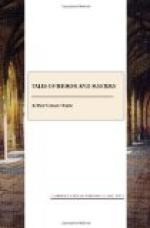After changing at Ipswich, a little local train deposited me at a small, deserted station lying amidst a rolling grassy country, with a sluggish and winding river curving in and out amidst the valleys, between high, silted banks, which showed that we were within reach of the tide. No carriage was awaiting me (I found afterwards that my telegram had been delayed), so I hired a dogcart at the local inn. The driver, an excellent fellow, was full of my relative’s praises, and I learned from him that Mr. Everard King was already a name to conjure with in that part of the county. He had entertained the school-children, he had thrown his grounds open to visitors, he had subscribed to charities—in short, his benevolence had been so universal that my driver could only account for it on the supposition that he had parliamentary ambitions.
My attention was drawn away from my driver’s panegyric by the appearance of a very beautiful bird which settled on a telegraph-post beside the road. At first I thought that it was a jay, but it was larger, with a brighter plumage. The driver accounted for its presence at once by saying that it belonged to the very man whom we were about to visit. It seems that the acclimatization of foreign creatures was one of his hobbies, and that he had brought with him from Brazil a number of birds and beasts which he was endeavouring to rear in England. When once we had passed the gates of Greylands Park we had ample evidence of this taste of his. Some small spotted deer, a curious wild pig known, I believe, as a peccary, a gorgeously feathered oriole, some sort of armadillo, and a singular lumbering in-toed beast like a very fat badger, were among the creatures which I observed as we drove along the winding avenue.
Mr. Everard King, my unknown cousin, was standing in person upon the steps of his house, for he had seen us in the distance, and guessed that it was I. His appearance was very homely and benevolent, short and stout, forty-five years old, perhaps, with a round, good-humoured face, burned brown with the tropical sun, and shot with a thousand wrinkles. He wore white linen clothes, in true planter style, with a cigar between his lips, and a large Panama hat upon the back of his head. It was such a figure as one associates with a verandahed bungalow, and it looked curiously out of place in front of this broad, stone English mansion, with its solid wings and its Palladio pillars before the doorway.
“My dear!” he cried, glancing over his shoulder; “my dear, here is our guest! Welcome, welcome to Greylands! I am delighted to make your acquaintance, Cousin Marshall, and I take it as a great compliment that you should honour this sleepy little country place with your presence.”




